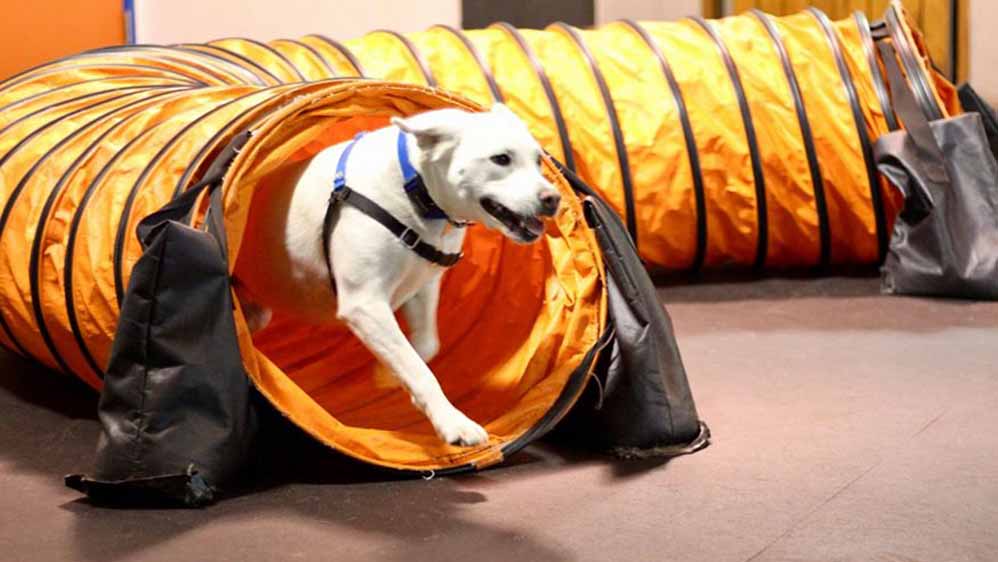Dog Training Charlotte NC: Your Path to a Mannerly Dog
Dog Training Charlotte NC: Your Path to a Mannerly Dog
Blog Article
Unlock Your Dog's Possible: Proven Canine Training Strategies for Success
Efficient dog training is a nuanced procedure that hinges on understanding canine actions and utilizing scientifically backed approaches. By integrating positive support, establishing clear commands, and prioritizing socialization, pet owners can grow an efficient relationship with their pet dogs.
Comprehending Dog Actions
Understanding pet habits is essential for efficient training and fostering a favorable relationship in between dogs and their proprietors. A comprehensive understanding of canine body language, articulations, and social communications is important for recognizing their feelings and needs. Pets communicate mostly through non-verbal hints; as an example, a wagging tail might indicate enjoyment, while pinned ears can signify concern or entry.

Moreover, environmental elements play a considerable function in forming a pet dog's actions. Adjustments in regular, new surroundings, or the existence of unfamiliar people can bring about stress or anxiety in canines. Acknowledging these triggers allows owners to alleviate negative responses and establish suitable training techniques.
Eventually, a deep understanding of pet dog habits lays the foundation for successful training methods, boosting both habits and the general bond between the dog and its owner. dog training charlotte nc. This understanding is vital for cultivating a well-adjusted, satisfied canine buddy
Favorable Support Techniques
Reliable training depends greatly on favorable reinforcement methods, which have been revealed to generate significant lead to forming desired behaviors in dogs. This method includes awarding a pet dog for exhibiting details behaviors, therefore enhancing the likelihood that these habits will certainly be repeated. Benefits can take different forms, consisting of treats, praise, toys, or playtime, relying on what motivates the private dog.

It is necessary to gradually phase out rewards as the canine discovers the actions, transitioning to intermittent support. This strategy maintains the habits with time while protecting against dependence on consistent incentives. By concentrating on positive support, trainers can grow a trusting partnership with their dogs, promoting a cooperative and healthy training setting that improves overall obedience and performance.
Establishing Regular Commands
A fundamental facet of effective pet dog training is the facility of consistent commands. Uniformity in commands is essential for efficient communication between the pet dog and the trainer. When commands are consistent, special info dogs discover to connect details words with desired actions, which speeds up the training process and improves understanding.
To develop constant commands, it is essential that all relative use the exact same terminology and gestures. If one person utilizes "sit" while my sources another claims "rest down," it can develop complication for the pet. Select clear, distinctive words for commands and make certain every person associated with the canine's training adheres to these choices.
Enhance commands via regular method, ensuring that the pet dog receives ample chances to react correctly. When a pet effectively follows a command, immediate favorable support ought to comply with.
Last but not least, be individual. Developing consistent commands takes some time and effort. With commitment and clarity, you will assist your dog establish a solid understanding of assumptions, eventually leading to a well-behaved buddy.
Socialization and Exposure
Interacting socially a pet dog is important for fostering a certain and well-adjusted companion. This process involves exposing your canine to a variety of environments, people, and various other animals to develop their social abilities and adaptability. Early socialization, ideally in between the ages of 3 to fourteen weeks, is crucial, as it lays the foundation for a canine's future actions.
During socialization, goal to supply favorable experiences in various settings, such as parks, hectic streets, and homes with other pet dogs. Introduce your canine to numerous stimulations, including noises, sights, and scents, ensuring that each experience is satisfying. This direct exposure aids reduce worry and stress and anxiety, paving the means for a much more durable dog.
Involving in regulated group play sessions with More about the author various other canines can additionally improve social skills, educating your animal ideal interactions and limits. Focusing on socialization will considerably add to your pet dog's general joy and actions throughout their life.
Overcoming Common Educating Challenges

An additional constant issue is disturbance. Dogs might battle to concentrate in active or unknown setups. Slowly desensitize your canine to interruptions by starting training in a peaceful atmosphere and slowly introducing more stimuli as they end up being skilled (Dog training). Positive reinforcement strategies, such as deals with and praise, can maintain motivation and focus.
Furthermore, behavior issues like jumping or excessive barking can end up being irritating. Address these by showing alternative habits, such as resting steadly when welcoming guests. Uniformity and persistence are important; strengthen wanted habits consistently and prevent abuse, which can lead to complication.
Last but not least, acknowledge that each dog is distinct, and training timelines might differ. Dressmaker your method to your dog's specific requirements, and seek expert assistance if needed. With perseverance and the right techniques, getting rid of these obstacles can lead to a well-trained, delighted canine friend.
Conclusion
Finally, unlocking a pet dog's prospective requires a thorough strategy that includes an understanding of canine habits, the application of favorable support techniques, and the establishment of regular commands. Early socializing and exposure to varied environments additionally improve a pet dog's flexibility and confidence. By dealing with common training obstacles with customized strategies and perseverance, a participating and harmonious partnership in between canine and handler can be fostered, eventually resulting in a mannerly companion with the ability of thriving in various situations.
Effective canine training is a nuanced process that pivots on recognizing canine behavior and using scientifically backed techniques.Recognizing pet dog habits is essential for efficient training and cultivating a positive connection in between pet dogs and their owners.Effective training relies heavily on positive support techniques, which have been revealed to generate significant results in forming preferred actions in pets. When commands are consistent, pet dogs discover to connect particular words with wanted habits, which increases the training procedure and boosts understanding.
In final thought, unlocking a dog's prospective requires a thorough strategy that includes an understanding of canine behavior, the application of positive support strategies, and the facility of constant commands.
Report this page